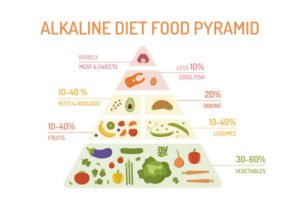The Alkaline Diet, also known as the Alkaline Ash Diet or Acid-Alkaline Diet, has garnered significant attention for its purported health benefits, which range from improved energy levels to cancer prevention. At its core, the diet is based on the premise that certain foods can affect the pH balance of the body, specifically the urine, and that maintaining an alkaline state can lead to better health outcomes. This article delves into the science, claims, benefits, and criticisms of the Alkaline Diet, providing a comprehensive overview of its efficacy and practicality.
 The Science Behind the Alkaline Diet
The Science Behind the Alkaline Diet
The pH scale, which ranges from 0 to 14, is a measure of how acidic or alkaline (basic) a substance is, with 7 being neutral. Anything below 7 is considered acidic, while anything above 7 is alkaline. The human body has various pH levels across its different systems and organs, all of which are maintained within specific ranges to ensure proper function and homeostasis. For instance, blood pH is tightly regulated around 7.4, which is slightly alkaline. Other parts of the body, like the stomach, maintain a highly acidic environment with a pH of about 1.5 to 3.5, which is necessary for breaking down food and killing pathogens.
Body’s pH Regulation Mechanisms
The body employs several sophisticated mechanisms to regulate pH and maintain this delicate balance. The primary organs involved in pH regulation are the lungs and kidneys. The lungs control the balance of carbon dioxide (a component of carbonic acid in the blood) through respiration. By altering the rate and depth of breathing, the body can increase or decrease the amount of CO2 expelled, thus adjusting blood pH.
The kidneys contribute by excreting excess acids or bases through urine. They filter the blood, reabsorbing bicarbonate and excreting hydrogen ions as needed to maintain pH balance. This process also involves the formation of ammonium ions and phosphate buffering.
Diet and pH: The Theory
Proponents of the Alkaline Diet argue that the modern diet, which is high in processed foods, meats, and refined sugars, leads to an acidic internal environment. This, they claim, can result in various health issues, such as decreased bone density, increased risk of chronic diseases, and impaired cellular functions. The theory posits that consuming foods that leave an “alkaline ash” after digestion can help shift the body’s pH towards a more alkaline state, promoting overall health and preventing disease.
 Alkaline and Acidic Foods
Alkaline and Acidic Foods
Alkaline-Promoting Foods: These include most fruits and vegetables, nuts, seeds, and legumes. Examples are spinach, kale, avocado, almonds, and tofu. These foods are believed to leave an alkaline residue, or “ash,” once metabolized, which supposedly helps to neutralize acid in the body.
Acid-Promoting Foods: These include meat, dairy products, eggs, grains, and processed foods. Examples are beef, cheese, eggs, white bread, and soda. These foods are thought to leave an acidic residue, contributing to a lower pH level in the body.
Evaluating the Claims
Impact on Urine pH vs. Blood pH: While diet can influence urine pH, the body’s overall pH, especially the blood, remains tightly regulated and relatively unaffected by dietary changes. This is because the kidneys and respiratory system swiftly correct any minor deviations to maintain the necessary pH balance for physiological processes.
Health Implications: The theory extends to suggest that an acidic environment in the body can lead to various health problems, including bone demineralization. The argument is that the body may leach minerals such as calcium from bones to neutralize acid, leading to conditions like osteoporosis. While some studies indicate that a diet high in fruits and vegetables is associated with better bone health, it is not solely due to their alkaline nature but rather their overall nutrient content.
Cancer and Chronic Diseases: Another claim is that an acidic body environment fosters the development of chronic diseases, including cancer. This is partly based on the observation that cancer cells tend to thrive in acidic environments in laboratory settings. However, the human body’s internal environment, particularly the blood, is maintained at a stable pH regardless of diet, and there is no substantial evidence that altering diet-induced pH can directly affect cancer growth in humans.
 Health Claims and Potential Benefits
Health Claims and Potential Benefits
Weight Loss
The Alkaline Diet is often promoted as an effective weight loss strategy due to its emphasis on nutrient-dense, low-calorie foods. This section explores the mechanisms by which the Alkaline Diet may facilitate weight loss and examines the scientific evidence supporting these claims.
1. Reduced Caloric Intake
The Alkaline Diet prioritizes the consumption of foods that are naturally low in calories but high in nutrients. These foods include a wide variety of fruits, vegetables, nuts, seeds, and legumes. By focusing on these types of foods, individuals are likely to consume fewer calories overall compared to diets high in processed foods, refined sugars, and animal products.
Fruits and vegetables, for instance, have a high water content and are rich in fiber. This combination can help individuals feel full and satisfied while consuming fewer calories. Fiber adds bulk to the diet and slows the digestion process, leading to prolonged feelings of satiety and reduced overall food intake. This natural reduction in calorie consumption can contribute significantly to weight loss over time.
2. Increased Nutrient Density
A key feature of the Alkaline Diet is its focus on nutrient-dense foods, which provide essential vitamins, minerals, and antioxidants without excessive calories. Nutrient density is crucial for weight loss because it ensures that while calorie intake is reduced, the body still receives the necessary nutrients to function optimally.
For example, leafy greens such as spinach and kale are low in calories but high in essential nutrients like vitamins A, C, and K, as well as minerals like iron and calcium. Consuming a diet rich in such foods can enhance overall health, boost metabolism, and support weight loss efforts. The high nutrient content can also help mitigate common issues associated with calorie restriction, such as nutrient deficiencies and fatigue.
3. Regulation of Blood Sugar Levels
The Alkaline Diet’s emphasis on whole, unprocessed foods can help regulate blood sugar levels, which is a critical factor in weight management. High-glycemic foods, such as refined sugars and processed grains, cause rapid spikes and subsequent crashes in blood sugar levels. These fluctuations can lead to increased hunger and overeating, making weight loss more challenging.
In contrast, the Alkaline Diet includes foods with a low glycemic index, which release glucose more slowly and steadily into the bloodstream. This steady release helps maintain consistent energy levels and reduces the likelihood of sudden hunger pangs and cravings for unhealthy foods. By stabilizing blood sugar levels, the Alkaline Diet can support more controlled eating patterns and prevent overeating.
4. Enhanced Digestion and Gut Health
Fiber-rich foods, which are a cornerstone of the Alkaline Diet, play a crucial role in promoting healthy digestion and gut health. Adequate fiber intake supports regular bowel movements, reduces constipation, and helps maintain a healthy balance of gut bacteria. A healthy gut microbiome is increasingly recognized as an important factor in weight management and overall health.
Studies have shown that certain gut bacteria can influence the way the body processes and stores fat. A diet high in fiber can encourage the growth of beneficial bacteria that support a healthy weight. Moreover, good digestion ensures that nutrients are efficiently absorbed, contributing to overall metabolic health and supporting weight loss.
5. Reduction of Inflammation
Chronic inflammation is linked to various health issues, including obesity and metabolic syndrome. The Alkaline Diet’s emphasis on anti-inflammatory foods—such as fruits, vegetables, nuts, and seeds—can help reduce inflammation in the body. Many of these foods are rich in antioxidants, which combat oxidative stress and reduce inflammation.
For instance, berries, leafy greens, and nuts contain high levels of antioxidants and phytonutrients that have anti-inflammatory properties. By reducing inflammation, the Alkaline Diet can improve metabolic function and facilitate weight loss. Lower inflammation levels also support overall health, potentially reducing the risk of chronic diseases that can be exacerbated by excess weight.
6. Encouragement of Healthy Lifestyle Changes
Adopting the Alkaline Diet often leads to broader lifestyle changes that can contribute to weight loss. Individuals who follow the diet are encouraged to make mindful choices about their food intake, which can extend to other areas of their lives, such as physical activity and stress management.
The focus on whole, unprocessed foods may also lead individuals to cook more at home, thereby gaining better control over their food choices and portion sizes. Additionally, the emphasis on hydration—an important aspect of the Alkaline Diet—can further support weight loss. Staying well-hydrated can enhance metabolism, reduce feelings of hunger, and improve overall energy levels.
 Cancer Prevention
Cancer Prevention
One of the most prominent and controversial claims associated with the Alkaline Diet is its potential role in cancer prevention. Advocates of the diet argue that an alkaline environment within the body can inhibit the growth and proliferation of cancer cells. This belief is rooted in the observation that cancer cells tend to thrive in acidic environments in vitro (in laboratory settings outside a living organism).
The Scientific Basis
Cancer cells indeed exhibit a preference for acidic conditions. The Warburg effect, a well-documented phenomenon, describes how cancer cells produce energy by glycolysis followed by lactic acid fermentation in the cytosol, which results in the production of lactic acid and consequently an acidic microenvironment. This acidification is a byproduct of their altered metabolism and supports their growth and invasiveness.
Proponents of the Alkaline Diet extrapolate these findings to suggest that by consuming alkaline-promoting foods, one can alter the body’s internal environment, making it less conducive to cancer cell growth. The theory posits that reducing the body’s acidity through diet can help starve cancer cells or at least slow their progression.
The Body’s pH Regulation Mechanisms
However, it is crucial to understand the body’s sophisticated mechanisms for regulating pH levels. The human body maintains a tightly controlled blood pH around 7.4, a slightly alkaline state, through complex physiological processes involving the lungs and kidneys. The lungs regulate pH by controlling carbon dioxide levels through breathing, while the kidneys manage bicarbonate levels and excrete acids through urine. This homeostatic balance ensures that the body’s pH remains stable, regardless of dietary intake.
Urine pH can fluctuate based on the foods consumed, reflecting the body’s efforts to maintain this internal balance. For example, consuming a meal high in acid-forming foods, such as meats and cheeses, can result in more acidic urine, while a diet rich in alkaline-forming foods, like fruits and vegetables, can produce more alkaline urine. However, these changes in urine pH do not translate to changes in blood pH.
Evidence from Clinical Studies
When examining the evidence from clinical studies, the support for the Alkaline Diet’s impact on cancer prevention is limited and inconclusive. Most of the research linking diet and cancer focuses on overall dietary patterns rather than specific pH-related changes. Diets high in fruits, vegetables, and whole grains—common components of the Alkaline Diet—are generally associated with lower cancer risk, but this is attributed to the presence of antioxidants, fiber, vitamins, and minerals, rather than any direct effect on body pH.
A comprehensive review published in the “Journal of Environmental and Public Health” found no substantial evidence that dietary-induced pH changes affect cancer progression. The authors concluded that while maintaining a diet rich in plant-based foods is beneficial for overall health, there is no direct link between dietary pH manipulation and cancer prevention.
Practical Implications
While the notion that an alkaline diet can prevent or treat cancer is appealing, it is essential to approach such claims with a critical perspective. The scientific consensus emphasizes that a balanced, nutrient-rich diet, regular physical activity, and avoidance of known carcinogens (such as tobacco and excessive alcohol) are the most effective strategies for reducing cancer risk.
The Alkaline Diet’s focus on increasing the intake of fruits, vegetables, nuts, and seeds aligns with general dietary recommendations for cancer prevention. These foods are high in phytochemicals, fiber, and essential nutrients that contribute to overall health and may help lower cancer risk. However, attributing these benefits specifically to their alkalizing effects oversimplifies the complex interactions between diet and cancer.
 Improved Bone Health
Improved Bone Health
One of the most frequently cited benefits of the Alkaline Diet is its potential to enhance bone health and prevent conditions such as osteoporosis. This claim is grounded in the hypothesis that by consuming foods that promote alkalinity in the body, one can mitigate the need for the body to draw upon its own mineral stores to maintain blood pH levels. Specifically, proponents of the diet argue that a high intake of alkaline foods can prevent the leaching of essential minerals, such as calcium and magnesium, from bones, thereby promoting stronger bones and reducing the risk of osteoporosis.
Mechanism of Bone Health Improvement
The underlying mechanism proposed involves the body’s acid-base balance. The human body strives to maintain a stable pH in the blood, which is tightly regulated around 7.4. If the diet is high in acid-forming foods, it is suggested that the body must buffer this acidity. One proposed method of buffering is through the release of alkaline substances from the bones, such as calcium, which can neutralize excess acid in the bloodstream. This process, over time, could theoretically lead to a reduction in bone density and increase the risk of osteoporosis.
Evidence Supporting the Alkaline Diet for Bone Health
There is some supportive evidence indicating that diets rich in fruits and vegetables are beneficial for bone health. These foods are generally high in vitamins and minerals that are crucial for maintaining bone density and overall skeletal strength. For instance:
- Calcium and Magnesium: Both minerals are fundamental components of bone. Green leafy vegetables, nuts, and seeds, which are prominent in the Alkaline Diet, are good sources of these minerals.
- Vitamin K: Found in green leafy vegetables, Vitamin K is essential for bone metabolism and the regulation of calcium in the body.
- Vitamin C: This vitamin, abundant in fruits and vegetables, is vital for collagen formation, which is a key component of bone matrix.
A meta-analysis published in the “Journal of Bone and Mineral Research” indicated that an increased intake of fruits and vegetables is associated with higher bone mineral density in older adults. Additionally, the “Framingham Osteoporosis Study” found that greater fruit and vegetable intake was linked to a lower risk of hip fractures in the elderly.
Controversies and Debates
Despite these correlations, the direct impact of diet-induced pH changes on bone health remains a topic of debate within the scientific community. Several points of contention include:
- Physiological pH Regulation: The body’s regulatory systems, including the kidneys and respiratory system, maintain blood pH within a narrow range. Dietary intake has minimal impact on blood pH, leading some researchers to argue that the body’s buffering system is sufficient without needing to leach minerals from bones.
- Scientific Studies: Some studies have found no significant link between the acid-alkaline properties of foods and bone demineralization. For example, a study published in the “Osteoporosis International” journal concluded that dietary acid load does not negatively affect bone health in healthy adults.
- Complexity of Bone Health: Bone health is influenced by a multitude of factors, including genetics, physical activity, hormonal balance, and overall nutrition. Isolating the impact of diet-induced pH changes from these other factors is challenging.
Integrating the Alkaline Diet for Bone Health
While the scientific community continues to investigate the precise effects of the Alkaline Diet on bone health, there are practical steps individuals can take to potentially benefit their skeletal system:
- Increase Fruit and Vegetable Intake: Consuming a variety of fruits and vegetables ensures a rich intake of vitamins, minerals, and antioxidants essential for bone health.
- Ensure Adequate Protein: While the Alkaline Diet emphasizes plant-based foods, it’s important to maintain adequate protein intake for bone and muscle health. Plant-based proteins such as beans, lentils, and tofu can be good alternatives to animal proteins.
- Limit High-Acid Foods: Reducing the intake of highly processed foods, sugary drinks, and excessive animal proteins may contribute to better overall health, potentially benefiting bone density indirectly.
- Balance with Physical Activity: Weight-bearing exercises and strength training are critical components of maintaining and improving bone density.
 Enhanced Kidney Function
Enhanced Kidney Function
One of the notable claims of the Alkaline Diet is its potential to enhance kidney function. This assertion is based on the idea that by consuming foods that are more alkaline, the body’s overall acid load is reduced, thereby easing the burden on the kidneys. Here’s a deeper exploration of how this process works and the scientific backing behind it.
Understanding Kidney Function and Acid-Base Balance
The kidneys play a crucial role in maintaining the body’s acid-base balance by excreting hydrogen ions and reabsorbing bicarbonate from urine. This process is vital in regulating the pH level of the blood. A diet high in acid-forming foods, such as meats and processed grains, can increase the acid load on the kidneys, potentially leading to a condition known as metabolic acidosis, particularly in individuals with pre-existing kidney conditions.
How an Alkaline Diet May Benefit Kidney Health
Reduction in Acid Load: By emphasizing alkaline-promoting foods like fruits and vegetables, the Alkaline Diet may decrease the net acid load in the body. This reduced acid load can lessen the kidneys’ workload, as they do not need to excrete as much acid.
Prevention of Kidney Stones: One of the primary benefits proposed by proponents of the Alkaline Diet is the prevention of kidney stones. Kidney stones can form when there is an imbalance in the substances that make up urine. High acidity levels can lead to the formation of uric acid stones, while calcium stones can form in both acidic and alkaline environments. However, a diet that promotes more alkaline urine may reduce the likelihood of uric acid stones forming.
Improved Kidney Function: Chronic kidney disease (CKD) is characterized by a gradual loss of kidney function. Patients with CKD often struggle with maintaining acid-base balance, leading to an increased risk of metabolic acidosis. Studies suggest that a diet rich in fruits and vegetables can improve metabolic acidosis in CKD patients, potentially slowing the progression of kidney disease. By reducing dietary acid intake, the Alkaline Diet might help maintain better kidney function over time.
Scientific Evidence Supporting the Alkaline Diet for Kidney Health
Epidemiological Studies: Research has shown that populations consuming diets high in fruits and vegetables tend to have lower rates of kidney stones and better overall kidney health. These findings suggest a potential link between diet-induced changes in acid load and kidney health.
Clinical Trials: Some clinical studies have explored the effects of alkaline diets or bicarbonate supplements on kidney health. For instance, a study published in the “American Journal of Kidney Diseases” found that dietary acid reduction via increased fruit and vegetable intake improved kidney function markers in patients with hypertensive kidney disease. Another study indicated that bicarbonate supplementation, which mimics the effects of an alkaline diet, helped slow the progression of kidney disease in patients with chronic kidney disease.
Mechanistic Studies: Research on the mechanisms behind diet and kidney health supports the idea that reducing dietary acid load can improve kidney function. By decreasing the need for acid excretion, the kidneys can operate more efficiently, potentially reducing the risk of kidney-related complications.
Considerations and Balanced Perspective
While the Alkaline Diet offers promising benefits for kidney health, it is crucial to approach it with balance and consider potential limitations:
- Individual Variation: The impact of dietary changes on acid-base balance and kidney health can vary based on individual health conditions, genetic factors, and overall dietary patterns. Consulting with healthcare professionals, particularly for individuals with existing kidney conditions, is recommended before making significant dietary changes.
- Nutritional Adequacy: Ensuring a well-rounded intake of nutrients is important. While focusing on alkaline-promoting foods, it is vital to maintain adequate protein intake and consider potential deficiencies in nutrients like vitamin B12, iron, and calcium, which are abundant in animal products.
Conclusion
The Alkaline Diet promotes the consumption of healthier, plant-based foods while reducing processed foods and certain animal products. While its specific claims regarding pH and disease prevention are not strongly supported by scientific evidence, many of its principles align with general dietary recommendations for health improvement. As with any diet, it is essential to ensure a balanced intake of all necessary nutrients to avoid deficiencies. Further research is needed to fully understand the potential benefits and limitations of the Alkaline Diet.
Adopting a balanced approach that includes a variety of nutrient-dense foods is likely the best strategy for long-term health. Whether or not one follows the Alkaline Diet strictly, its emphasis on fruits, vegetables, and whole foods is a valuable takeaway for anyone looking to improve their diet and overall health.
Here’s a example 7-day alkaline diet menu:
Day 1:
Breakfast:
- Alkaline green smoothie made with spinach, kale, cucumber, celery, lemon juice, and a tablespoon of chia seeds.
- A serving of fresh fruit, such as berries or sliced melon.
Snack:
- Raw almonds or walnuts.
Lunch:
- Mixed green salad with avocado, cherry tomatoes, sliced cucumbers, and a drizzle of olive oil and lemon dressing.
- Grilled or steamed vegetables, such as broccoli, asparagus, and bell peppers.
Snack:
- Sliced bell peppers with hummus.
Dinner:
- Baked salmon with a squeeze of lemon juice.
- Quinoa or wild rice.
- Steamed kale or Swiss chard.
Day 2:
Breakfast:
- Quinoa porridge topped with sliced bananas, berries, and a sprinkle of cinnamon.
- Herbal tea or green tea.
Snack:
- Fresh fruit, such as an apple or pear.
Lunch:
- Lentil or chickpea salad with mixed greens, diced tomatoes, cucumbers, and a light balsamic vinaigrette.
- Steamed or roasted sweet potatoes.
Snack:
- Celery sticks with almond butter.
Dinner:
- Grilled chicken breast marinated in herbs and lemon juice.
- Roasted Brussels sprouts with garlic.
- Brown rice or millet.
Day 3:
Breakfast:
- Oatmeal cooked with almond milk and topped with sliced almonds and fresh berries.
- Herbal tea or green tea.
Snack:
- Carrot sticks with hummus.
Lunch:
- Quinoa and vegetable stir-fry with colorful veggies like bell peppers, broccoli, and snap peas, seasoned with low-sodium soy sauce or tamari.
- Mixed green salad with lemon-tahini dressing.
Snack:
- Greek yogurt with a sprinkle of chia seeds.
Dinner:
- Baked tofu with ginger and garlic.
- Sautéed kale with garlic and lemon.
- Cauliflower rice or zucchini noodles.
Day 4:
Breakfast:
- Chia seed pudding made with almond milk, topped with sliced kiwi and a sprinkle of shredded coconut.
- Herbal tea or green tea.
Snack:
- A handful of pumpkin seeds.
Lunch:
- Quinoa salad with mixed vegetables, such as bell peppers, cherry tomatoes, and steamed broccoli, dressed with a lemon-herb vinaigrette.
- Steamed edamame beans.
Snack:
- Sliced cucumbers with a squeeze of lemon juice.
Dinner:
- Grilled shrimp skewers marinated in garlic and herbs.
- Roasted eggplant slices.
- Buckwheat noodles or soba noodles with a light soy-based sauce.
Day 5:
Breakfast:
- Green smoothie bowl made with spinach, banana, almond milk, and topped with fresh berries and a sprinkle of granola.
- Herbal tea or green tea.
Snack:
- Raw cashews or pistachios.
Lunch:
- Mixed greens salad with sliced strawberries, sliced almonds, and a light raspberry vinaigrette.
- Grilled or steamed zucchini and yellow squash.
Snack:
- Sliced mango or pineapple.
Dinner:
- Baked cod with lemon and herbs.
- Quinoa or couscous.
- Steamed asparagus.
Day 6:
Breakfast:
- Almond butter and sliced banana on whole-grain toast.
- Herbal tea or green tea.
Snack:
- A small handful of dried apricots or figs.
Lunch:
- Lentil soup with vegetables, such as carrots, celery, and spinach.
- Steamed brown rice or barley.
Snack:
- Sliced bell peppers with guacamole.
Dinner:
- Grilled portobello mushrooms marinated in balsamic vinegar and herbs.
- Roasted sweet potatoes.
- Mixed greens salad with cherry tomatoes and a light lemon-tahini dressing.
Day 7:
Breakfast:
- Omelet made with egg whites, spinach, tomatoes, and mushrooms.
- Herbal tea or green tea.
Snack:
- Raw carrot sticks with hummus.
Lunch:
- Quinoa and black bean bowl with diced avocado, corn kernels, and a squeeze of lime.
- Steamed broccoli.
Snack:
- Sliced pear with almond butter.
Dinner:
- Baked chicken breast seasoned with herbs and lemon.
- Steamed or roasted Brussels sprouts.
- Wild rice or bulgur wheat.
Remember to drink plenty of water throughout the day to stay hydrated. Feel free to adapt the menu to your preferences and nutritional needs. It’s always a good idea to consult with a registered dietitian or healthcare professional for personalized guidance on your dietary choices.
Enjoy your alkaline diet journey!
For more alkaline recipes you can get inspired from the page greenschemetv
Click here if you want to see more articles from the diet category
Disclaimer:
The information provided in this dietary article is intended for educational purposes only and should not be considered a substitute for professional medical advice. While dietary recommendations can offer potential benefits, it's crucial to recognize that individual responses may differ. Factors such as metabolism, existing health conditions, and nutritional needs can impact the appropriateness and efficacy of these recommendations. Therefore, it is strongly advised to seek guidance from a qualified healthcare professional or nutritionist before implementing any dietary changes. This ensures that you receive personalized advice tailored to your unique dietary requirements and health status.
Furthermore, it's essential to understand that while we strive to offer accurate and beneficial information, we do not accept responsibility for the usage of these dietary recommendations. Individual experiences and outcomes may vary, and readers are encouraged to exercise caution and discretion when adopting new dietary practices. By proceeding with the implementation of these dietary recommendations, readers acknowledge and accept this disclaimer.

 The Science Behind the Alkaline Diet
The Science Behind the Alkaline Diet Alkaline and Acidic Foods
Alkaline and Acidic Foods Health Claims and Potential Benefits
Health Claims and Potential Benefits Cancer Prevention
Cancer Prevention Improved Bone Health
Improved Bone Health Enhanced Kidney Function
Enhanced Kidney Function